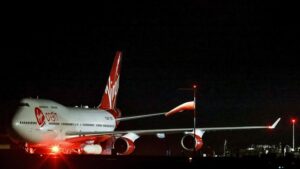
The first attempt to launch satellites into orbit from British soil ended in a “painful” failure at the final hurdle last night as the rocket made it into space but failed to reach the right altitude, with its multimillion-pound cargo of satellites left to break up in the atmosphere.
An investigation is now under way to find out why, after the first-stage engine had successfully blasted the rocket and its payload of nine satellites into space, the second stage engine suffered an unknown “anomaly” and failed to guide the rocket to its designated orbit.
A crowd of more than 2,000 spectators in Cornwall had whooped and cheered amid a festival atmosphere at Britain’s first spaceport as a Virgin Orbit jet, carrying a 24-tonne rocket beneath its wing, took off without a hitch at 10.02pm. Another cheer greeted the announcement that the plane had reached its drop point over the Atlantic Ocean to the southwest of Ireland, detached the rocket and had its first-stage engine successfully ignite at 11.10pm, setting it on a course for space.
It looked as if history would be made when Virgin Orbit tweeted less than ten minutes later that the rocket was in space and had reached orbit, and was starting to coast around the Earth before deploying the nine satellites.
The company revised this statement at 11.46pm, however, prompting groans from the crowd of spectators gathered by the dark and windswept runway. “We appear to have an anomaly that has prevented us from reaching orbit. We are evaluating the information.”
The party atmosphere among the food vans, bars and silent disco at Spaceport Cornwall, which had been in full swing since busloads of spectators started to arrive on site at 7pm, was immediately punctured. The crowds swiftly turned and headed for the car park to make their way home.
The Virgin Orbit jet landed safely back at Newquay airport shortly after midnight, and its dejected crew were told that the mission had failed. Dan Hart, the chief executive of Virgin Orbit, was on hand to thank them their hard work over several months in Britain and over the years beforehand, preparing for the first orbital launch from European soil.
Shares in Virgin Orbit slumped by 28 per cent during after-hours trading in New York after the company confirmed the failure of the launch. The company’s stock, already down 76 per cent over the past year, has been hit mounting concern over its prospects. It carried out only two launches in 2022, having initially forecast between four and six.
Matt Archer, head of commercial spaceflight at the UK Space Agency, said shortly before 1am: “The second-stage engine had a technical anomaly and didn’t reach the required orbit. We don’t know what caused that. But in effect, the rocket has not reached the required altitude to maintain its orbit or deploy the satellites, and therefore the mission was unsuccessful.”
Asked about the fate of the nine satellites, which were supplied by customers including the Ministry of Defence, the sultanate of Oman, and the US National Reconnaissance Office, Archer said: “They will probably break up, not all of it will burn up. But certainly that’s what they are tracking at the moment [to see] if there’s any debris field and making sure that’s coming down safely.” Any debris was expected to come down over the ocean, though it was unclear exactly where last night.
“It’s obviously disappointing it wasn’t successful, but we’ve lots of positives to take from today,” Archer added. “We’re proud of the fact that we’ve launched . . . We’ll dust ourselves off and we’ll go again. This is what space is about — it is hard.
“It matters to the team here at Spaceport Cornwall and it matters to everybody in Mission Control. They will feel this just as painfully as I will.”
Major Tim Peake, the British astronaut, had said it was due to be a “ground-breaking moment for the UK space industry” that would “show the great strides our nation is making to compete on a global stage”, but tweeted late last night: “So disappointing — but getting into space is hard and valuable lessons will be learned. We will wait to hear more.”
Hours earlier, children and their parents were on hand to witness history.
Among the crowd was Felix Gatfield, 14, from Reading, who had not only gained permission from his father to stay up long past his usual 9pm bedtime but also negotiated with his teachers for three days off school and a postponement of his mock GCSE exams.
Since he was 12 he has run his own YouTube channel called Felix’s Space Time, featuring rocket launches happening thousands of miles away. Last night he witnessed a launch on home soil. “This is the first launch I’ve seen in person . . . It’s amazing being so close to what’s happening, just three and a half hours away [from my home],” he said.
It was almost three hours past the bedtime of Xena Lewis, six, from Newquay, when the jet took off. Her mother, Vicky, 25, said: “We’re here to witness history, that’s why she’s up hours past her bedtime. Xena learnt about the launch in assembly at school.”
The UK Space Agency said a UK orbital launch would still take place, but could not say when. A Virgin Orbit statement is expected this morning.
Read more:
UK’s first space launch of Virgin Orbit rocket fails at final hurdle




